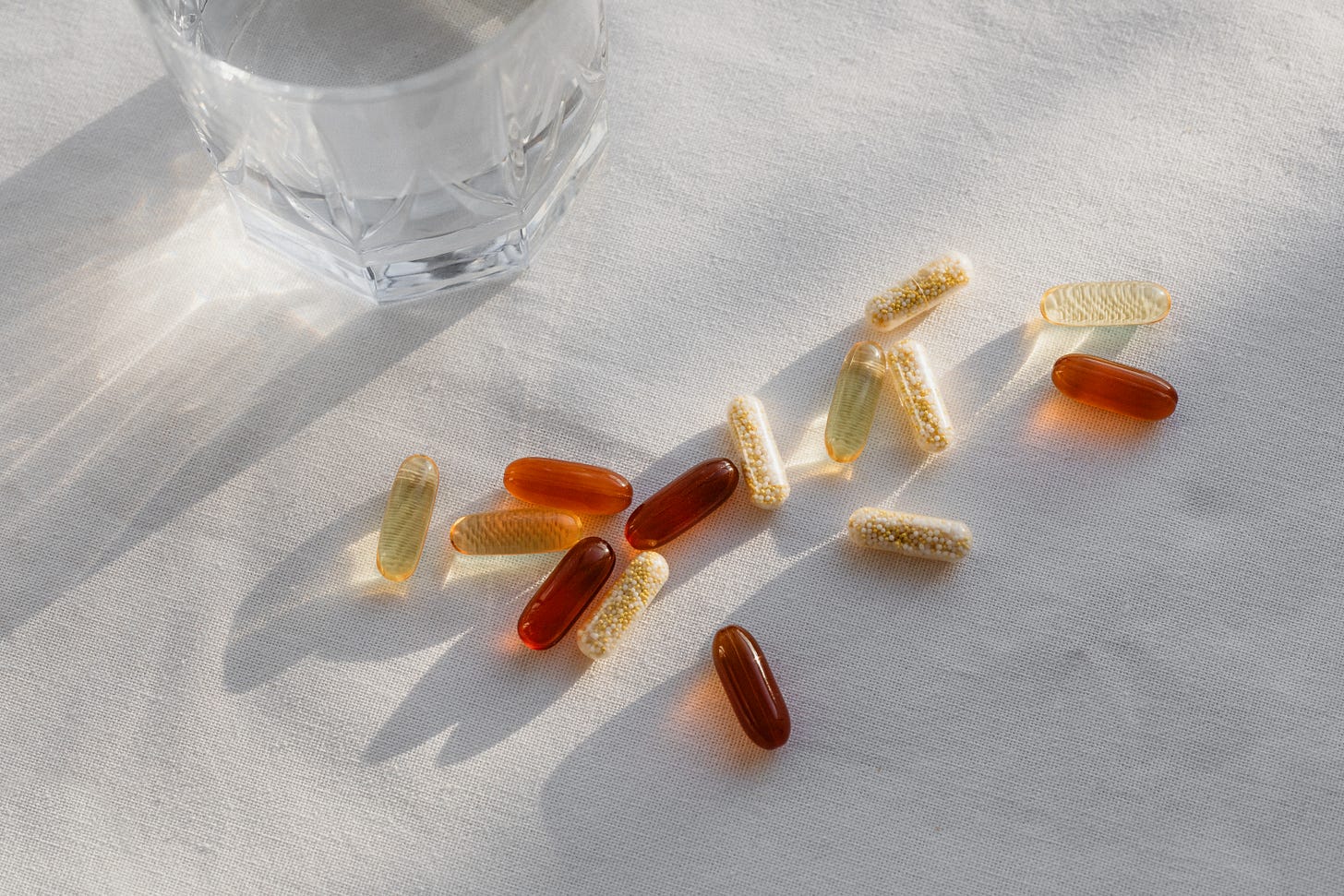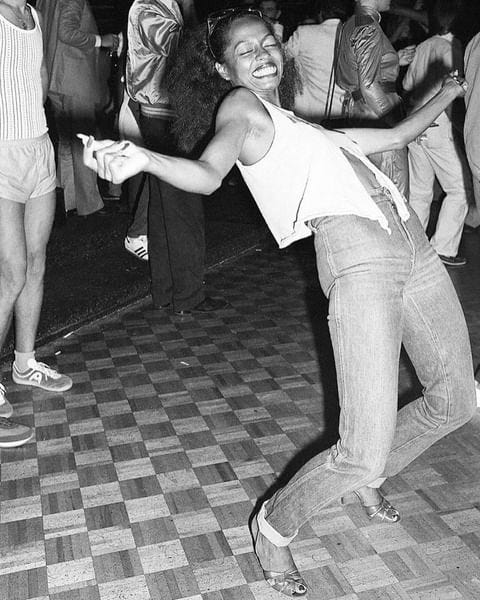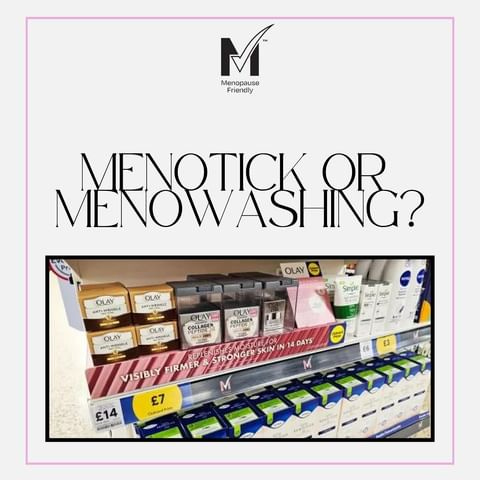The supplement gender gap
How to beat supplement fatigue and overwhelm, and find what works for you
Before I write anything about supplements, I always feel it’s important for me to remind you that I am not a doctor. My views on nutrition and supplementation are from my standpoint as a journalist who has learned certain things from personal experience, and much more from the experts that I have interviewed over the years.
I also feel it’s important to signpost you to the doctors who are writing about this subject with the benefit of their medical expertise, such as Dr Jen Gunter.
With that disclaimer acknowledged, I think there is something very interesting happening in the supplement industry right now.
After decades of women’s physiology being discounted (with some exceptions, such as prenatal vitamins), there’s a new generation of female-founded brands that are identifying and working to ease the issues faced specifically by women.
‘The lack of funding into women’s health is appalling,’ says Aoife Matthews, one of the three female co-founders of Sisterly, which launches in the UK this month. ‘Around 20% of men suffer from erectile dysfunction, while 90% of women suffer from menstrual issues, yet there’s five times more research into erectile dysfunction than there is into menstrual issues. And if you look at research trials more broadly, women have only typically been included in studies after 1993. So a lot of the products and drugs that we take today have only actually been tested on the male body.’
This ridiculous situation stems from the historic belief that women’s bodies are too complicated to include in research trials: women respond to drugs and supplements differently, depending on their life stage or the point in their cycle - so it’s easier to exclude them entirely, right? (If you haven’t read Invisible Women: Exposing Data Bias in a World Designed for Men, by Caroline Criado Perez, you should.)
Sisterly recruited Dr Daniel Jones to work on the formulation of their first supplement, The Elevator, which includes vitamin D3, a B vitamin complex and CoEnzyme Q10 for energy and immunity. It’s available online now and in Whole Foods from April. ‘We built a team of female health experts, including nutritionists, food scientists and doctors to interrogate us along the way,’ says Aoife. ‘We wanted a product that we could confidently recommend to our best friend, or our mother.’
Paid subscribers can scroll to the end for discounts on all brands mentioned here ⬇
Another female-founded brand doing this brilliantly is Wild Nutrition, whose food-grown ethos appeals to me. I love their Daily Multi-Nutrient for Women, which contains all the B vitamins and Ashwagandha, so feels both calming and energising. (Side note: their refillable glass jars are so much nicer than those big plastic tubs you see elsewhere.)
I feel like I’m getting what I specifically need from them, which is important when so many of us have supplement fatigue, with mixed messages about what to buy, and cupboards bursting with bottles of pills that we forget to take. The great thing about this conversation is that consumers are better-informed than ever.
This particularly applies to the peri/menopause point in life, around which women have never had so much information. While this new level of awareness is great in many ways, it has sparked a backlash about the rise of ‘menowashing’, whereby a brand puts the word ‘menopause’ on their branding and hoicks up the price.
I can see both sides of this debate, which is playing out over social media with some heated comments, and I can certainly see why any woman would feel angry at being handed a bag containing a jelly baby ‘in case you feel like biting someone’s head off’ (I mean, if you didn’t before…).
But I also think that, the more we talk about this, the better. Our nutritional needs do change during this time, so it makes sense to me that there are menopause-specific supplements, and I don’t object to GenM’s menopause-friendly MTick. While there will always be people looking to take advantage of those in need of a solution to an issue (this is true in every area of life), it’s a positive step that we’re now having these conversations out loud.
As someone who went through early menopause caused by chemo at age 40, I’m certainly glad that people are talking about this. And I’m eternally grateful to Dani Binnington of Menopause & Cancer, from whom I learned far more than from my doctor, oncologist and even the menopause clinic - who all seemed to have a real gap in their expertise around this.
For instance, the menopause clinic advised me to take glucosamine for brain fog, and it was only months later that I learned she meant to say l-glutamine. Similar name; totally different supplement! They also advised St John’s Wort for anxiety, but I looked up the brand they recommended and saw that it was packed with fillers and bulking agents. I have since found that a bath in magnesium salts and an Ashwagandha supplement have been much more effective.
Another thing I have found to be effective is prioritising gut health. By now, most of us are aware that the gut microbiome has an enormous impact on every aspect of our health, include our mood, immunity, hormones and nervous system. There are many probiotic supplements on the market now and, while some doctors are sceptical, I think they can be very helpful for those of us who don’t always manage to eat at least 50 different plants a week, or who live in an urban environment with a sedentary job.
Jo Lyall is the founder of The Better Menopause, and has formulated the Better Gut Probiotic with the company’s resident doctor, Dr Shahzadi Harper. It contains strains of bacteria with published medical research behind them, showing their efficacy for managing stress and anxiety, as well as improving hot flushes, vaginal dryness and sleep. I did an Instagram Live with Jo last week, which you can watch here…
Focusing on gut health to manage symptoms of peri/menopause is a growing area, and Wild Nutrition will launch their own Peri + Menopause Biotic next month. ‘Hot flushes, bloating and vaginal dryness are just three of the symptoms commonly associated with perimenopause and menopause,’ says Wild Nutrition founder Henrietta Norton. ‘And three of the reasons it was vital for me to formulate a supplement that uniquely addresses the profile changes of key flora associated with fluctuating hormones during these profound life stages.’
Of course, what we really need is for medical research and training around menopause to improve. While we should continue to support campaigns to change that, we can also take advantage of the newest advances to help us feel better.
Always bear in mind that everybody - and every body - is different. What works for one person might not work for another. This is an area where you have to get to know your own body and experiment to find what works for you.
For me, a foundational supplement + probiotic do seem to help with the low energy and high anxiety with which I struggled in the immediate aftermath of cancer treatment and menopause. But - and it’s a big but - taking those supplements is not the only thing I do. I eat healthily, move my body and prioritise sleep.
One thing that every single expert I speak to agrees on is this: there is no magic pill or silver bullet. No supplement stands a chance in a body that is stressed, sedentary, sleep deprived and overloaded with refined sugars, alcohol or ultra-processed foods.
Your liver is responsible for producing and metabolising hormones so, if it’s overloaded with booze or e-numbers, that is not good news for your hormonal balance. Research is ongoing into the impact of alcohol on your microbiome. And don’t neglect your nervous system, because no body functions optimally when flooded with stress hormones. You know what you need to do: exercise, sleep, breathe, eat your veg, get outside… Work on those things first.
That’s not to say that you can (or would necessarily want to) be doing all of those things perfectly every single day. You are probably dealing with work stress, or kids, or illness, or a social life, or just being a person living in the modern world. I certainly relate to all of the above. And I believe that supplements can help me out on the days when I have a big deadline, a night out and still have to organise a seven-year-old’s pirate-themed birthday party (at which I’ll be damned if I’m not having a slice of cake).
I know so many people who feel overwhelmed by the world of supplements, and confused as to whether or not they should be taking them. My personal belief is that not only can they be very helpful for supporting common deficiencies, such as vitamin D, vitamin B12 and iron (a GP can usually arrange a blood test for these), but also they can give you a ‘boost’ (not a medical term, I know) by ensuring you’re at optimum levels of all the good stuff. As with everything, it’s about balance. And supplements can be one of your tools to help steady the ship.
This week I’m…
Reading Unprocessed: How the Food We Eat Is Fuelling Our Mental Health Crisis by the brilliant Kimberley Wilson
Watching Jennifer Lopez’s utterly bonkers semi-autobiographical musical extravaganza about being a love addict, This Is Me… Now: A Love Story
Learning about the concept of ‘placefulness’ for wellbeing with atmospheric new podcast Lowlines
Stocking up my supplements cupboard with the following discounts…
Keep reading with a 7-day free trial
Subscribe to Well Well Well with Rosamund Dean to keep reading this post and get 7 days of free access to the full post archives.








